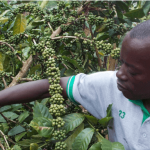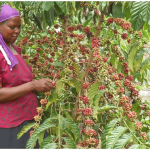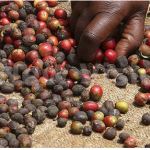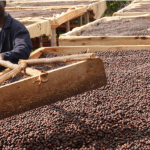Many farmers lose a lot of produce due to poor post-harvest handling among other reasons including lack of information, equipment, drying and storage facilities.
Quality is lost as many dry cereals on bare ground thus picking dust, stones and animal droppings. This is because most cereal producers are rural smallholder farmers.
Promising results
However, interventions to improve post-harvest handling are taking shape with Sasakawa Global 2000, Ruhiira Millenium Villages Project (RMVP), Nuuma Feeds and other partners.
The results are promising as production of cereals is being promoted, not only post-harvest but value addition as well.
Dennis Musiime, 47, from Masha Sub-county, Isingiro District, is a beneficiary. He attests that before he got trained in good agricultural practices, his production was very low.
“I would plant two acres of maize and beans but have poor yields and some of it would go bad. At times by harvest, they would have gone bad in the field. Also, I would dry them on the bare ground,” he says.
Empower farmers
Together with other farmers, they formed a cooperative society, Manya Akabi Area Cooperative Enterprise (Maace). It brings together 8,146 members in the district; most of whom are women. Musiime was elected chairperson of his village.
He has six acres under maize and has already harvested 2.2 tonnes of beans. “The beans earned me Shs2.2m and I expect to harvest 800 kg of maize, which will fetch me Shs3. 2m,” he says.
This has largely been possible because farmers like him have been empowered to grow for both food security and income generation.
“We have been taught to produce for the market through improved seeds, early planting techniques and fertilisers,” he says. “I used fertilisers and expect to use more.”
Molly Mbabazi, another farmer, is happy too. This season, she harvested two tonnes of beans and expects 200 kg of maize, which will bring in a total of Shs2.8m.
She attributes it to being a member of Maace, which has empowered women for better livelihoods .
“I do not depend on my husband. Each season, I earn good money. This has brought harmony in our family,” she says.
Clare Kabakyenga, general manager, Maace, points out that the cooperative has helped farmers with bulk sales, good agronomic practices, clean seed and storage equipment. It has done this in partnership with RMVP on a cost-sharing basis.
Boost income
“We have established 57 bulk centres, given farmers moisture meters, set up storage silos,” she says.
From bulking centres, the maize is brought to a central store in Kaberebere Town; it has a capacity to hold 850 tonnes. It is cleaned, graded and then packed into bags according to the market. They vary from 100-kilo bags to 90, 80, 60 and 50 kilos.
The clients include schools and traders and it is even sold in DR Congo, Sudan, Kenya, Burundi and Rwanda.
There are plans to procure machinery to process the maize into finished products, which will boost the income of farmers.
James Sendikadiwa, agriculture coordinator, RMVP, affirms there has been a significant improvement in the lives of the beneficiaries. “Farmers have been able to reduce aflatoxins, which are very dangerous to human and animals since farmers have silos and bags for proper storage.”
Beyond production
Another factor is availability of machines which ensures faster harvesting and processing.
Musiime says due to the shortage of labour during harvest season, he bought a maize sheller. It can shell 60 bags of maize per hour. For each bag, he charges Shs 3,000.
This has enabled his group to ensure timely shelling thus guaranteeing quality.
James Murangira, theme coordinator, Sasakawa Global 2000, adds that farmers have improved production tremendously through the introduction of machinery for post-harvest handling.
Farmers have moved beyond production because after harvest, they can dictate prices since they have storage facilities, which allow them to keep their produce until the market is favourable to them.
From Daily Monitor








